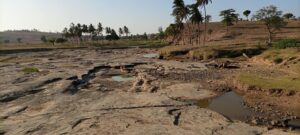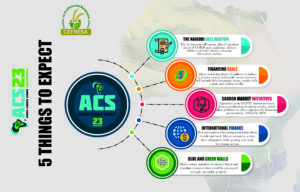A Closer Look at Expectations, Financial Initiatives, and Regional Collaboration
Africa is at a climate crossroads. The impact of climate change on the continent’s ecosystems, economy, and society has become increasingly undeniable. With 1.8 million Africans displaced due to prolonged droughts, catastrophic flooding in the Democratic Republic of Congo, the devastation caused by Cyclone Freddy in Malawi and Mozambique, and the bleaching of the corals and rising sea levels on the Kenyan Coastline, the urgency of climate action in Africa cannot be overstated. However, while Africa faces immense vulnerability to climate change, it also holds the potential to be a key player in climate solutions.

Climate change has led to environmental degradation, causing havoc to people’s livelihoods and endangering the species that are dependent on the wetlands.
Africa’s Potential for Climate Leadership
Africa’s vast natural resources, youthful population, critical mineral reserves, and arable land provide a unique opportunity to drive low-carbon green growth and catalyze climate action not only on the continent but globally. The forthcoming Africa Climate Summit, hosted by Kenya and co-organized with the African Union, promises to be a turning point in harnessing this potential.

Young Climate Action Leaders under the Student Climate Action Champions (SCAC) movement by CEFRESA where Climate Action champions are supported to embed the values of ecological responsibility and climate consciousness.
Anticipating the First Africa Climate Summit, 2023
Scheduled for September 4-6, 2023, the Africa Climate Summit will serve as a platform for Africa’s diverse voices on climate solutions to converge. This event is historic for being the first of its kind and its potential to chart a roadmap for low-carbon development across the continent. By the summit’s conclusion, African governments are expected to endorse the “Nairobi Declaration on Climate Change,” a document outlining commitments to renewable energy, sustainable agriculture, forest conservation, and more.
The significance of the Nairobi Declaration lies in its potential to spur momentum for climate action, not only leading up to the UN’s Africa Climate Week but also influencing subsequent regional climate weeks, the UN General Assembly, G20 meetings, and the UN climate summit (COP28) in November 2023. It also marks the formalization of Africa’s green growth agenda, positioning the continent as a global hub for climate solutions.
Africa Climate Week, 2023
Africa Climate Week is an annual event held in conjunction with the Africa Climate Summit. It will give an audience for all African leaders, politicians, corporate executives, and environmental campaigners in Nairobi, Kenya, to discuss the path forward in solving Africa’s pressing climate change concerns. Running from September 4th to 8th, the event will focus on debates to cut greenhouse gas emissions and adapt to the growing effects of the climate catastrophe throughout the continent.
Organized by the United Nations Framework Convention on Climate Change, the United Nations Development Programme, the United Nations Environment Programme, and the World Bank, with the support of regional partners, Africa Climate Week 2023 aims to build momentum for the upcoming UN Climate Change Conference in Dubai. It serves as a platform for discussions, solutions, and collaborations to address Africa’s pressing climate issues. You can stay updated on the event through UNEP’s spotlight on climate action.
ACW 2023 will consider four major systems-based tracks with a view to providing region-focused contributions to inform the global stocktake on:
- Energy systems and industry
- Cities, urban and rural settlements, infrastructure and transport
- Land, ocean, food, and water
- Societies, health, livelihoods, and economies
Key Issues at the Africa Climate Summit
As the Africa Climate Summit and UN Africa Climate Week provide platforms for exchange among policymakers, practitioners, businesses, and civil society, several critical issues must be addressed:
- Climate Finance for Adaptation and Loss and Damage: Africa, experiencing the world’s fastest temperature rise, faces severe impacts such as droughts and crop loss. Global funding has fallen short despite the need for $579 billion in adaptation funding by 2030. The summit presents an opportunity to advocate for climate finance reforms and demand that wealthy nations honor their commitments.
- Africa’s Energy Transition: Balancing electricity access and low-carbon energy systems is crucial for human development. Despite the potential in solar mini-grids and large-scale projects, Africa receives less than 1% of global clean energy investments. Discussions at the summit will explore mobilizing development finance and private capital for clean energy solutions.
- Equitable and Sustainable Cities: Achieving carbon-neutral cities in Africa is challenging due to rapid urbanization and inequities. With cities expected to double in population by 2050, discussions will focus on inclusive, low-carbon urban development, including e-mobility and essential services.
- Critical Minerals and Clean Energy Resources: Africa’s mineral wealth and clean energy potential require responsible resource governance. The summit may witness calls to restrict unprocessed mineral exports, promote local processing, and ensure safe, sustainable exploitation.
- Nature-Based Approaches: Preserving Africa’s biodiversity and carbon sinks is paramount. The summit is expected to renew commitments to halt biodiversity loss and landscape degradation, protecting vital ecosystems.

5 key things to expect from the Africa Climate Summit
The Summit as a Starting Point
While the Africa Climate Summit is a pivotal moment, it is not the end of the journey. Implementing the Nairobi Declaration hinges on political commitment, global financing, and the engagement of non-state actors. Africa can no longer be seen solely as a climate change victim; it is a climate solution provider. This summit is about showcasing African solutions as investment opportunities for the continent and the world. As the summit unfolds, let us stand with Africa as it takes the lead in shaping a sustainable, low-carbon future for all.
Article BY: Said N. Salim, reviewed by Mary Maina
